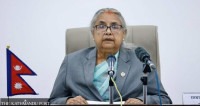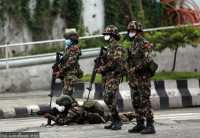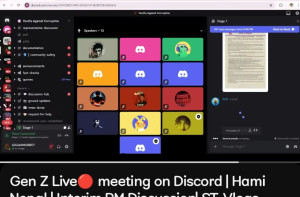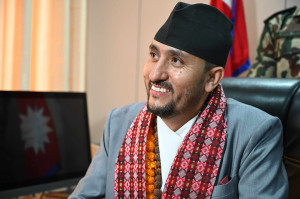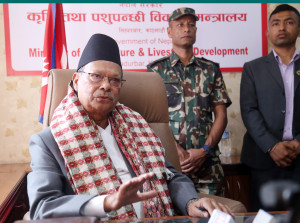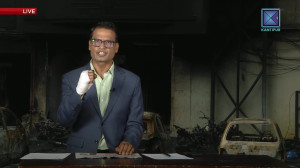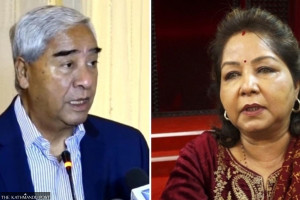Politics
Constitutional Council meet delay leaves six key positions vacant
Oli reportedly waiting for Parliament to pass amendments to council law to give him upper hand in decision-making.
Binod Ghimire
The Constitution of Nepal makes it mandatory to nominate office bearers in the constitutional bodies a month before any position becomes vacant.
Six positions, including the chairperson of a commission, have been lying vacant for months. However, it is unclear when the Constitutional Council will convene to nominate candidates for the vacant positions.
As the chair of the council, Prime Minister KP Sharma Oli is responsible for calling the meeting. “I have no information on when the council’s meeting will be called,” said Ram Sharan Bajagain, the prime minister’s press coordinator.
Since assuming office, Oli has called the council’s meeting just once, in October 2024, when it recommended Prakash Man Singh Raut as the chief justice. Though other council members wanted to nominate candidates for all the vacant positions, Oli had assured to summon another meeting for it, but the meeting has been called yet.
The National Inclusion Commission has been without its chairperson for months since Ram Krishna Timilsina retired at the age of 65. The acting chair is also retiring next month on age grounds. Except for the National Human Rights Commission, the chief and members of all other constitutional bodies retire at 65.
The Election Commission has also been short of a commissioner for around a year. Although the council led by then Prime Minister Pushpa Kamal Dahal in June last year had nominated Krishna Man Pradhan for the position, he withdrew after being embroiled in controversy. He was accused of sexual exploitation of a woman.
While two positions of members are vacant in the Natural Resources and Fiscal Commission, the Muslim Commission Nepal and the National Women Commission each have one vacant member position.
The main opposition claims that despite repeated demands, Oli has been reluctant to call the council’s meeting.
“The prime minister, during the meeting to nominate the chief justice, had assured us that there would be another sitting to pick candidates for the remaining vacant positions. But he has never called the meeting, even ignoring public calls from our chair,” said Govinda Acharya, personal secretary to CPN (Maoist Centre) chair Pushpa Kamal Dahal, who is a member of the council in his capacity as the main opposition leader.
“He has a habit of making unilateral decisions as he did during his previous stint as prime minister. As he cannot bulldoze his decisions this time due to the council’s composition, he is stalling the meeting,” Acharya said.
The six-member council, led by Oli, includes Chief Justice Prakash Man Singh Raut, Speaker Devraj Ghimire, National Assembly chair Narayan Dahal, Deputy Speaker Indira Rana, and Dahal, as the leader of the main opposition, as members.
As Dahal and Rana, who are Maoist Centre and Rastriya Swatantra Party leaders, respectively, are most likely to stand with the opposition bloc, Oli does not command a majority in the council.
Even if Raut sides with Oli, the council will be evenly split at three members each.
“It is an open secret that the prime minister does not have a majority in the council,” said a top official at the Prime Minister’s Office. “On top of that, tensions between the UML and the Maoist Centre are at their peak. I don’t see the council’s meeting being called until the political dust settles.”
Delaying recommendations is also a violation of constitutional provisions. Article 284 (3) says the council must make recommendations for appointment under the constitution a month before the vacation of the office of the chief justice or a chief or member of a constitutional body.
UML leaders, however, argue that the prime minister is waiting for the federal parliament to pass a bill to amend the Constitutional Council (Functions, Duties, Powers and Procedures) Act before calling the meeting.
The bill registered in the House of Representatives on February 24, 2023, has been stuck in the House of Representatives even as a House Committee has already endorsed it. The State Affairs and Good Governance Committee had in May last year endorsed the bill, which has a provision that council chair’s (prime minister’s) consent is mandatory for any decision.
The bill says in case the decision cannot be made through consensus, the council can recommend the names with the consent of the prime minister and at least 50 percent of available members. If the bill gets endorsed, making decisions without Oli’s consent will not be possible.
“The prime minister is waiting for the bill to be endorsed before calling the council’s meeting,” said a UML leader.




 16.18°C Kathmandu
16.18°C Kathmandu
